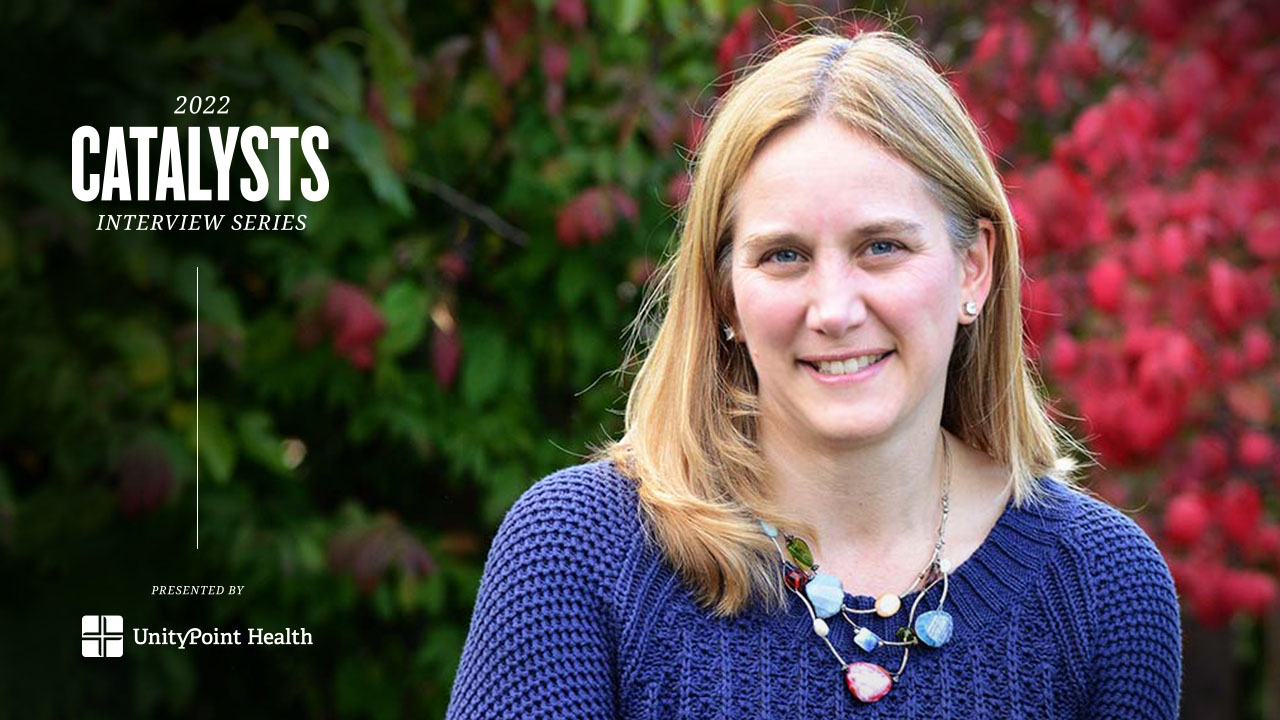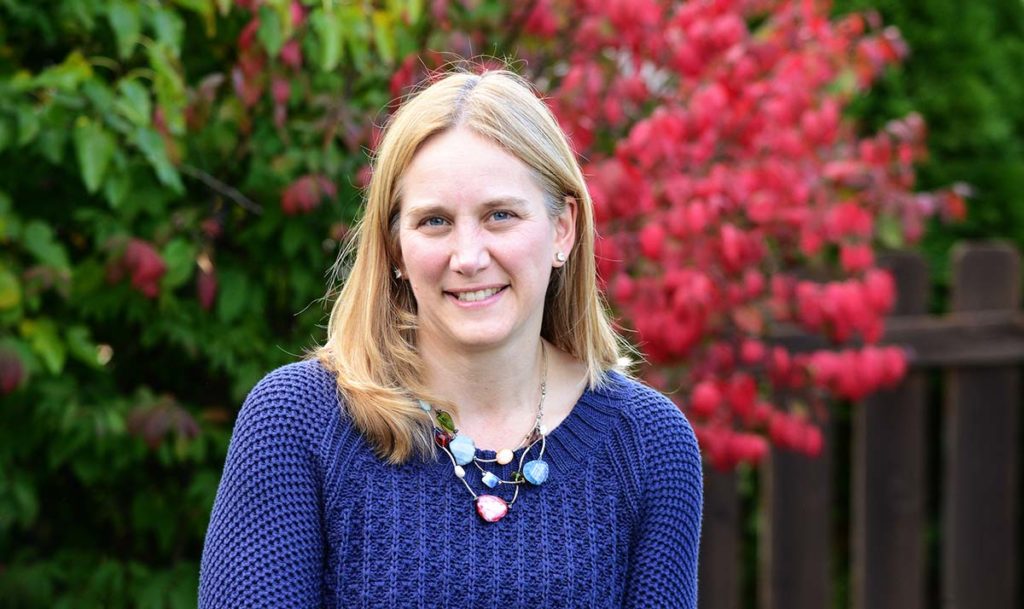
2022 Catalysts Interview – UnityPoint Health
As one UnityPoint Health patient stated, “Getting a person’s gender wrong in the rush of medical care may seem like a small thing, but to a person who has fought most of their life to have others identify them as their actual gender, it means the world.”
So, to answer that call and serve its patients as best as possible, UnityPoint Health has made important changes to its electronic health record, creating a culture of inclusion by using tools to provide patients with the opportunity to accurately identify themselves while also allowing for providers to learn the skills necessary to enhance the care experience.
The Technology Association of Iowa connected with Dr. Wendy Mortimore, chief medical information officer at UnityPoint Health, to learn more.
What sparked UnityPoint Health to begin a strong initiative on LGBTQ+ identification opportunities?
At UnityPoint Health, we pride ourselves on providing personalized care. Our brand promise is “know how much you matter to this world.” When several of our patients with alternative gender identities shared with us their concern that we were not able to appropriately identify them at a very basic level (for example, as a trans man) we knew we had to make a change.
UnityPoint Health has launched two LGBTQ+ clinics – one in Waterloo and another in Des Moines. How have those locations helped to launch this initiative?
The providers and patients in our LGBTQ+ clinics struggled with the setup of our electronic health record, which only allowed us to enter a patient’s legal name and legal sex. Based on the legal sex documented, any notes written would then default in male or female pronouns, which were often incorrect. Our LGBTQ+ clinic providers did not have the basic tools they needed to support the inclusive, respectful environment that they were looking to create. This didn’t feel right, especially at these dedicated clinics.
What are the goals of this initiative?
The electronic health record should enable all care team members to welcome and respect transgender and gender non-conforming patients by showing a patient’s chosen identifiers whenever possible. The record should also support clinicians in delivering appropriate medical care by providing information that allows them to treat each patient based on current anatomy. Additionally, the electronic health record should facilitate straightforward communication with external administrative and billing systems such as Medicare, Medicaid, private insurance and state records agencies.

Technology offers you a great opportunity to change the world around you – to meet needs or solve problems in most any field, including science, agriculture, education, manufacturing or, in my case, healthcare.
- Dr. Wendy Mortimer
Prior to launching the updated system, how did the providers and staff of UnityPoint Health buy into this initiative?
The biggest challenge was around the cultural change. We did have some initial resistance from a minority of team members. Many of these team members felt uncomfortable and awkward asking these types of questions. We quickly realized that to be successful in creating a more inclusive and welcoming environment, it would be critical to partner this new technology change with cultural education for the whole organization.
Dr. Kyle Christiason, a family physician and the founder of our Waterloo LGBTQ+ clinic, worked closely with our clinical education team to create some great resources to help our staff and care teams across UnityPoint Health better understand issues affecting the LGBTQ community, define LGBTQ terminology and concepts, and apply these skills to their roles in the healthcare environment. They reassured team members that it is okay to be uncomfortable and shared tips on how to recover from mistakes (especially around names and pronouns) that may occur.
From the technology side of the program, what obstacles did the team overcome?
[From a technical aspect], this change was more difficult than I expected. It was not as simple as just adding new data fields for preferred name, gender identity, sex assigned at birth, sexual orientation, preferred pronouns, an organ inventory checklist, and discrete documentation of any steps toward transition. First, we needed to identify all the places in the electronic health record where the legal name and legal sex were used, such as for identity matching and clinical decision support. We then needed to establish which one of our many new fields was most appropriate to map to each specific workflow going forward.
For example, a patient’s preferred name, gender identity, and preferred pronouns should map to patient-facing fields and other spots in the electronic health record where care team members would look when addressing a patient to ensure respectful communication (for example, name on the schedule and hospital room, patient wristband, clinical documentation screens and patient portal).
The patient’s organ inventory, transition steps, sex assigned at birth, and sexual orientation should also map to any clinical decision support that drives health maintenance reminders, as well as quality and safety alerts. Additionally, the patient’s legal sex often needs to map to downstream systems for identity matching, such as lab, pharmacy, and billing, as many of these systems only support legal sex.
Prior to this project, I didn’t appreciate how many of our electronic health record workflows were reliant on the documentation of a patient’s legal sex.
How has UnityPoint Health changed its perspective on diversity, equity, and inclusion (DEI)?
UnityPoint Health’s new CEO, Clay Holderman, has led the creation of a new system strategy that is centered around advancing talent and culture. A key component of this work includes the creation of an enterprise DEI strategy. In the past, DEI initiatives at UnityPoint Health were started by grassroots, employee-led groups which often evolved over time into regional DEI committees. UnityPoint Health is committed to expanding best practices around DEI to an enterprise level as evidenced by the hiring of a new chief diversity officer, Daniel Joiner, who reports directly to our CEO. This new role shows that UnityPoint Health is committed to ensuring DEI remains a top-level leadership priority rather than a one-time initiative. In addition, Daniel Joiner is partnering with our chief clinical officer, Dr. Dave Williams, to create a Health Equity Council that will drive initiatives to improve health equity for our underserved and underrepresented patients. Health equity is a critical health topic that needs to be addressed to truly care for our most vulnerable populations.
What advice would you give to K-12 students who might consider a technology career path or aspire to a leadership role?
Technology is an amazing industry. It’s one of the fastest growing careers worldwide. Technology offers you a great opportunity to change the world around you – to meet needs or solve problems in most any field, including science, agriculture, education, manufacturing or, in my case, healthcare.
While I work in technology as a chief medical information officer, my background is not in technology – I’m not a techie. I am a clinician who has pursued focused training in technology for the purpose of improving the clinical care of patients and improving the lives of our providers. I use technology as a way to improve healthcare – the space that I’m passionate about.
If you are interested in leadership, some advice I would provide is to surround yourself with people smarter than you and learn to be comfortable and actually welcome people who don’t agree with you or challenge the status quo because they help think of new ways to solve problems. Leadership is often about the soft skills – developing trust, aligning team members around common goals and then growing and empowering others to be successful.
Health equity is a critical health topic that needs to be addressed to truly care for our most vulnerable populations.
- Dr. Wendy Mortimer

